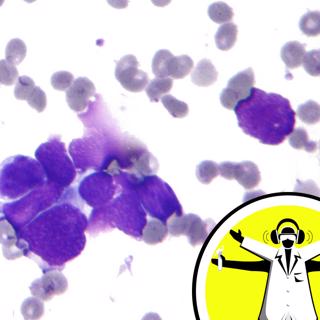
Cutting Edge in Cancer
From detecting tumour DNA in our bloodstreams to making cancer cells stand out in an MRI scan, this week, coinciding with the NCRI Cancer Conference, we explore how best ways to detect cancer and monitor tumours during treatment. Plus, in the news, what a dog's wagging tail can tell you about its mood, the chemistry behind fireworks, how wind farms could be made up to 30% more efficient just by moving the turbines around, and the electronic blood that could help to shrink supercomputers... Like this podcast? Please help us by supporting the Naked Scientists
5 Nov 201355min
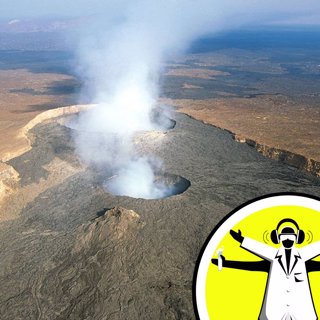
Extreme Geology
Live on location at the Cambridge Science Centre, Chris Smith, Dave Ansell, Ginny Smith and guests James Jackson, an Earth Scientist, Tehnuka Ilanko, a volcanologist, and Arwen Deuss, a seismologist, pit their wits against the assembled public as they tackle the extreme Earth. Plus Dave and Ginny make a flame tornado, a volcanic crater and explain why acid rain can be so damaging... Like this podcast? Please help us by supporting the Naked Scientists
29 Okt 201359min
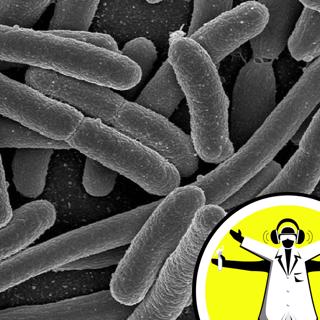
Stopping Superbugs
What is the scale of the superbug problem? How much is antibiotic resistance costing? Can new antibiotics be made that cannot be bypassed by bacteria? And what new drugs are already in the pipeline. In this infectious episode of the Naked Scientists, we put the rise of antimicrobial resistance under the microscope and ask what scientists are doing to combat the problem. Plus, why the abominable snowman hasn't been discovered...yeti, 46-million-year-old blood from a fossilised mosquito, phage therapy for C. diff and the brain wash-out that happens when we sleep... Like this podcast? Please help us by supporting the Naked Scientists
19 Okt 201354min

Tunnelling Under London
How do you dig a 26 mile tunnel beneath a city and below the water table? This week we drop in on Crossrail, who are busy constructing a new commuter line below the UK capital, to discover how massive tunnels are made in the modern era. Plus, we take a walk along the World's first and oldest tunnel built below a river to hear how it was made, and we find out what present-day tunnelling is turning up of London's past. Also, news of a drug that can repair the brain damage done by multiple sclerosis, and a planet found floating alone in interstellar space... Like this podcast? Please help us by supporting the Naked Scientists
14 Okt 201354min
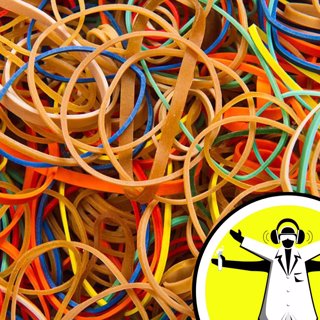
Science Centre Showoff
Live on location at the Cambridge Science Centre, Chris Smith, Dave Ansell, Ginny Smith and guests Rod Jones, an atmospheric chemist, Margaret Stanley, an HPV cancer researcher, and Caroline Goddard, jet engine metallurgist, pit their wits against the assembled public. Plus Dave and Ginny make crisp packet fireworks, prove you can't be heard screaming in space and make an elastic-band-powered fridge... Like this podcast? Please help us by supporting the Naked Scientists
7 Okt 201354min

Science of Sleep
What's the best way to catch 40 winks? We investigate the science of sleep, including why we need it and why do some people fall asleep at the wrong times? Jason Rhiel tell us how he investigates what makes us sleepy using zebrafish and Mick Hastings explains the effects of shift work on our health. Plus, in the news, nanoparticles deliver vaccines without needles, the 4,000 year old body perfectly preserved in a bog, an animal that can keep track of tides, a new nose grown on a forehead, and nurturing new neurones to treat Parkinson's... Like this podcast? Please help us by supporting the Naked Scientists
30 Sep 201356min
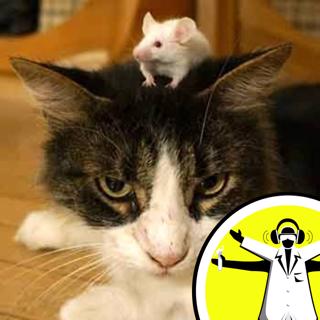
Citizen Science: Research You can Do
What's the best way to get involved in scientific research from home? Chris Smith and Dominic Ford investigate some of the best citizen science projects which are looking for your help. From categorising galaxies to hunting spiders, mapping your happiness and even discovering the nature of the trillion bacteria in one of your footprints - how will you choose to get involved? Plus, in the news, what a blue whale's earwax can reveal about ocean pollution, Curiosity fails to find methane on Mars, why Raspberry Pi have linked up with Google to boost kids programming skills, and the parasite that... Like this podcast? Please help us by supporting the Naked Scientists
23 Sep 201357min
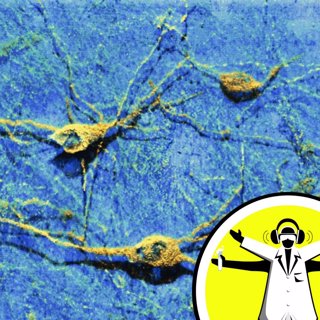
Shedding Light on the Brain
We expose how electricity powers the nervous system. Chris Smith and Hannah Critchlow speak to a panel of experts about why chillis taste hot and mint feels cool, how ion channels could tackle diabetes and the new technique that uses algae could shed light on the brain. In the news, re-programming stem cells in situ, the TV programme that's changing accents 400 miles away, the insects that use natural gears to propel themselves and how you can tell whether a panda is pregnant. Like this podcast? Please help us by supporting the Naked Scientists
16 Sep 201353min





















